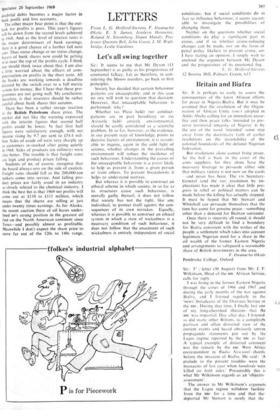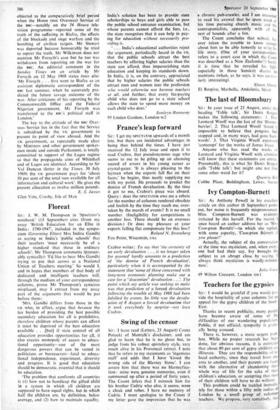Britain and Biafra
Sir: It is perhaps to early to assess the consequences of the latest African efforts for peace in Nigeria-Biafra. But it may be assumed that the resolution of the Organ- isation of African Unity (emu) adopted in Addis Ababa calling for an immediate cease- fire and then peace talks 'intended to pre- serve territorial integrity of Nigeria' is by the use of the word 'intended' some step away from the doctrinaire faith of earlier resolutions on the inviolability of the colonial boundaries of the defunct Nigerian federation.
But resolutions alone cannot bring peace. So the ball is back in the court of the arms suppliers, for they alone have the necessary leverage to persuade either side that military victory is not now on the cards —and never has been. The UN Secretary- General (and the OAU resolution by im- plication) has made it clear that little pro- gress in relief or political matters can be made before the killing has actually stopped. It must be hoped that Mr Stewart and Whitehall can persuade themselves that the time has come for genuine peace—something other than a demand for Biafran surrender.
Once there is sincerity all round, it should not be very difficult to find a boundary for Biafra consistent with the wishes of the people, a settlement which takes into account legitimate Nigerian need for a share in the oil wealth of the former Eastern Nigeria and arrangements to safeguard a reasonable share of British investments in the area.
F. lheanacho Okole Pembroke College, Oxford
Sir: T. / letter (30 August) from Mr. J. F. Wilkinson, Head of the BBC African Service, calls for reply.
I was living in the former Eastern Nigeria through the crises of 1966 and 1967 and during the early months of the war against Biafra, and I listened regularly to the 'news' broadcasts of the Overseas Service of the BBC. During that time, I finally lost one of my long-cherished illusions—that the BBC was impartial. Day after day, I listened as did many other Britons, to a completely partisan and often distorted view of the current events and heard obviously untrue propaganda statements put out by the Lagos regime reported by the inic as fact A typical example of distorted comment was the remark by the BBC West Africa correspondent in Radio Newsreel . short!) before the invasion of Biafra. He said : 'A prelude to the present troubles were the massacres of last year when hundreds were killed on both sides.' Presumably this it what Mr Wilkinson regards as an 'objectiv' assessment'.
The answer to Mr Wilkinson's argument that the Lagos regime withdrew facilities from the BBC for a time and that the, deported Mr Stewart is surely that the objected to the comparatively brief period when the Home (not Overseas) Service of the Bac—notably on the 24 Hours tele- vision programme—reported some of the truth of the suffering in Biafra, the effects of th6 blockade and siege warfare and the bombing of civilian targets. Mr Stewart was deported because honourably he tried to report the truth. Mr Wilkinson does not mention Mr Forsyth's case but he too was withdrawn from reporting on the war for the Bac. An editorial comment in the Sunday Times on an article by Mr Forsyth on 12 May 1968 states inter alia: `Mr Forsyth . . . first went to Biafra as an assistant diplomatic correspondent of the BBC last summer, when he accurately pre- dicted the future savage outcome of the war. After criticisms of his reporting by the Commonwealth Office and the Federal Nigerian government, Mr Forsyth was transferred to the BBC's political staff in London.'
The key to the attitude of the BBC Over- seas Service lies in the fact that the Service is subsidised by the Inc government to present its point of view abroad. And the UK government, as repeatedly made clear by Ministers and other government spokes- men inside and outside Parliament, is totally committed to support of the Lagos regime so that the propaganda aims of Whitehall and of Lagos are identical. According to Sir Val Duncan (letter in the Times, 30 July 1969) the UK government pays for 'about 50 per cent of the total sum available for all information and cultural work'. He gives the present allocation as twelve million pounds.
E. S. James Glen Vine, Crosby, Isle of Man









































 Previous page
Previous page